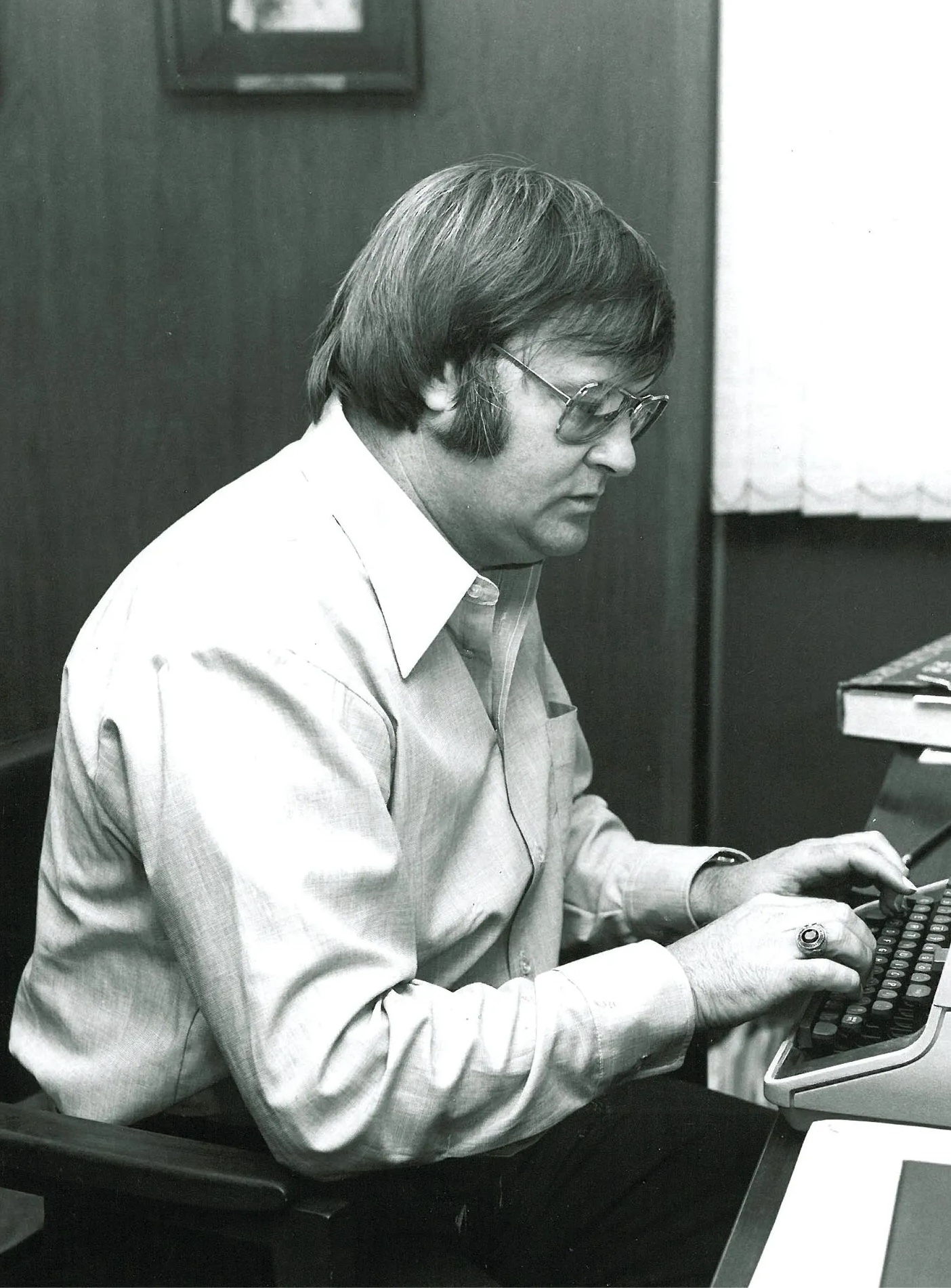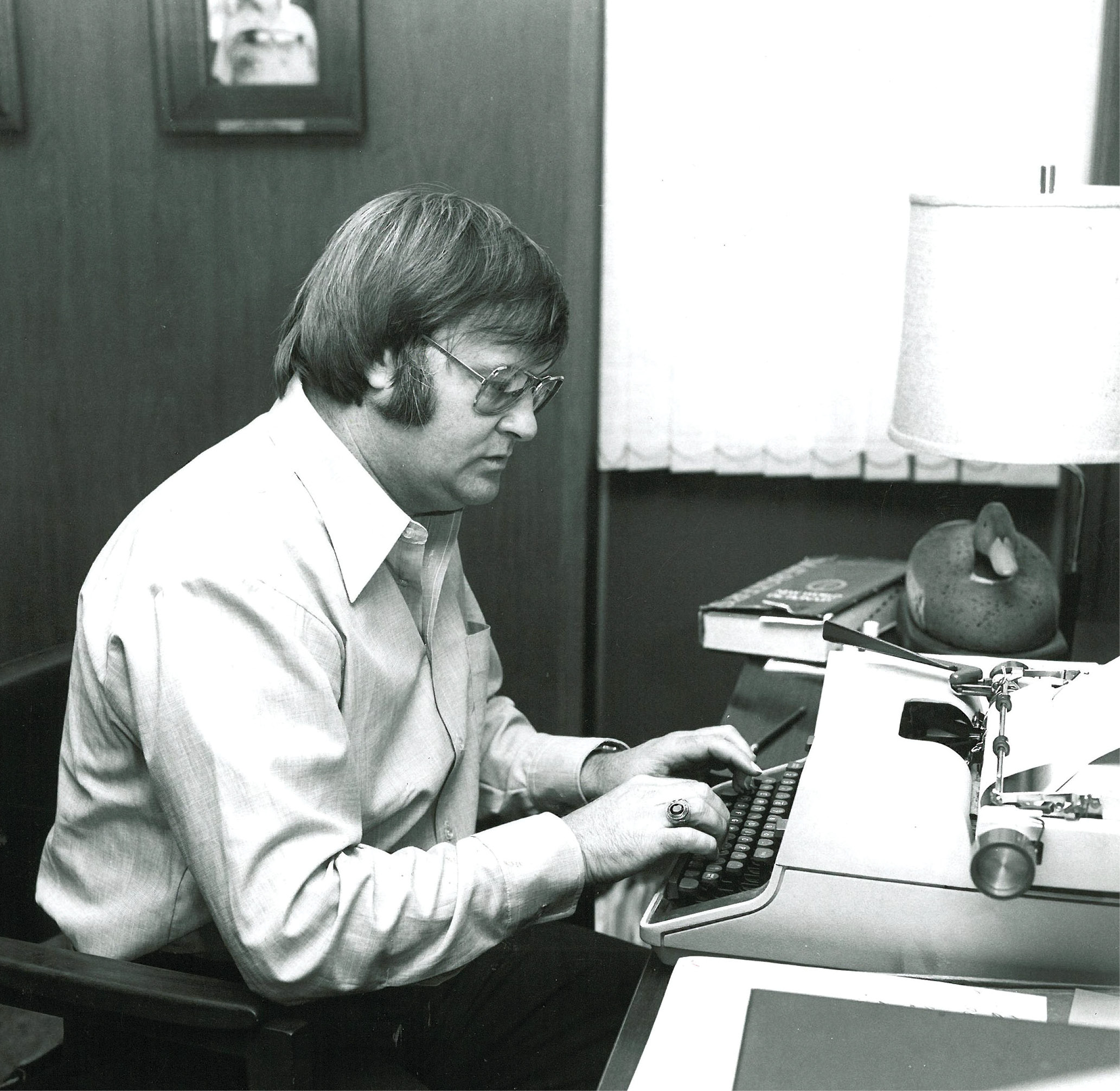
The time was in the 1960s, the golden years of outdoor magazines like Field & Stream, Outdoor Life and Sports Afield. “The Big Three” ruled the newsstands and magazine racks. The odds were stacked against a lowly start-up publication like Bassmaster Magazine surviving in the dog-eat-dog world of publishing. But, we did it! You are holding the 500th issue, a collector’s treasure.
The backstory of how Bassmaster became known as “The Bible Of Bass Fishing” is almost as biblical as the story of David defeating the giant Goliath. By late 1968 Ray Scott’s fledgling Bass Anglers Sportsman Society (B.A.S.S.) emblem was being worn by over 2,000 card-carrying members. The Society was on the march, but Ray needed help to keep up the pace.
“I had too many oars in the pond,” admitted Scott. “Just the B.A.S.S. tournaments were a time-consuming task. Running here and there, keeping a handle on the membership mailings and [being] bogged down trying to edit a magazine for which my English and writing skills were sorely limited.”
As to the grammar shortcomings, Scott openly joked about how his college professor at Auburn University remarked after Scott challenged the teacher’s D-minus grade on his term paper. “Mr. Scott, your writing and use of the English language is atrocious but adequate to express your thoughts.”
The articles in Scott’s first attempt to edit as the publisher of Bassmaster didn’t sing with flowery English prose either, but rather B.A.S.S. members’ proven techniques learned over endless casts trying to catch the elusive black bass.
“Fishermen were hungry for bass fishing facts,” asserted Scott. “The handwritten pages submitted by members were often stained by coffee cup rings where the writer had labored at the kitchen table to unwind his innermost-kept how-to secrets.”
Scott admitted, “I didn’t monkey around much with the author’s copy. Our readers glanced over the slaughtered grammar, digging out the true bass fishing facts. Despite the poor sentence structure, they couldn’t put the magazine down. I wasn’t a true editor, as such, to rewrite or clean up the wording. A single thought or sentence might scrawl over a page or more of notebook paper.”
At one point Ray just told his office assistant, “Get some scissors. Cut this up into some paragraphs, and tell the printer run with it.” However, although the first 36-page issue lacked a polished writing style and the slick four-color photos and well-honed narrative of “The Big Three” outdoor magazines, Bassmaster found its niche. It was written by bass anglers in a language spoken by bass fishermen for the dedicated bass chaser.
The Bassmaster reader didn’t have to turn page after page searching for a tidbit of bass fishing how-to squeezed between articles on trout fishing the Amazon or fly tying to “match the hatch.”
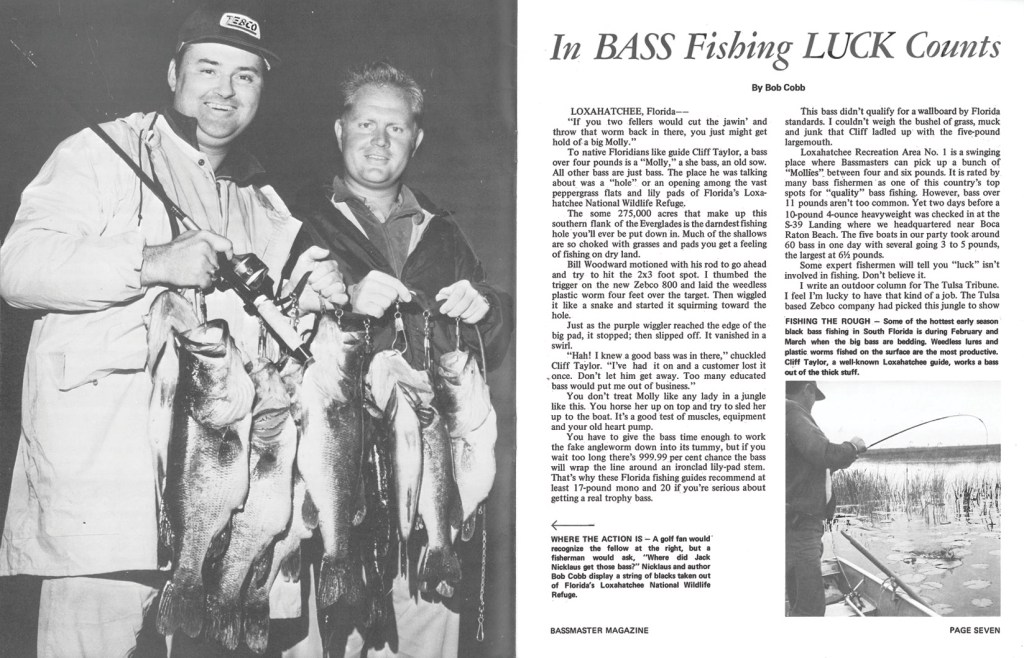
The B.A.S.S. membership mailings made it clear: “If you mess with musky. Piddle with perch. Or fling a fly for trout. Our organization ain’t the place for you. We’re interested in a few more hairy-legged bass anglers. Come join us.”
In that first issue, Editor Scott cobbled together a couple of submissions by his contacts in the outdoor newspaper game, myself among them as outdoor editor of The Tulsa Tribune. As a result the B.A.S.S. Boss dangled the prospects of Bob Cobb becoming the first full-time editor of Bassmaster Magazine.
In January 1969 the country was midstream in the civil rights movement, and Alabama was caught in the middle. Governor George Wallace was standing in the schoolhouse door proclaiming: “Segregation today. Segregation tomorrow. Segregation forever!” Ironically, Scott’s B.A.S.S. office on Mt. Meigs Road was only blocks from Martin Luther King Jr.’s church on Dexter Avenue where King preached “I Have a Dream.”
The Cobb family dropped anchor on the street in front of Scott’s office building, and a moment of doubt surfaced about taking the editor’s post. Across the street the curb was lined with headstone grave markers displayed by the Montgomery Monument Company. Were these tombstones a disturbing forecast for our future? The front door to the B.A.S.S. headquarters was a back door down the alleyway of the Woolard Building and offices of a construction company. The builders had constructed a small add-on wing for the Ray Scott “Fishing Enterprise.”
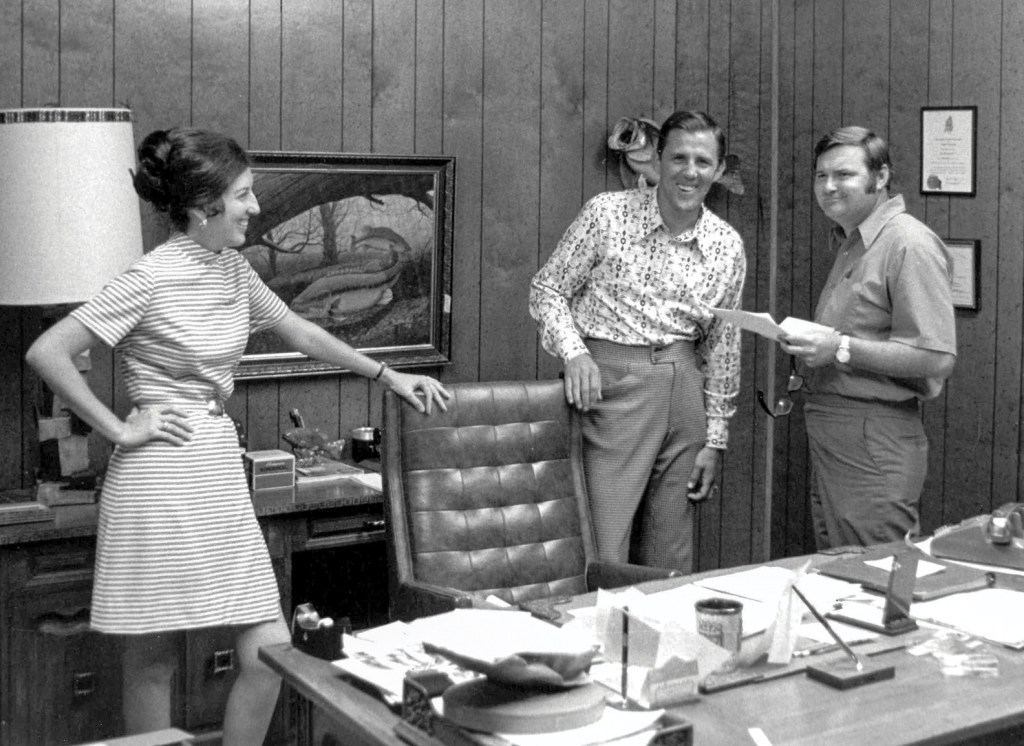
Inside, Ray guided us down a narrow hallway to the working office for the newly hired editor of Bassmaster. Perched on a waist-high counter was a secondhand Royal manual typewriter purchased from Montgomery Loan & Pawn shop for $55. The previous occupant was a draftsman. The indirect lighting was geared for reading blueprints. Ray had finished furnishing the layout with a Pro-Throne, an elevated jump seat out of a bass rig.
“That’s the magazine file in that box,” pointed out Scott, and he left to take a phone call.
It was a pickle-jar box from a local company that read: “Whitfield Pickles. The pickle with the perfect pucker. Picked at the peak of perfection by particular pickle pickin’ people.” For another doubting moment my mind questioned, “Are we in the middle of being caught in a pickle?”
Opening that pickle box was like Alice in Wonderland falling down the rabbit hole to meet the Queen of Hearts or the Mad Hatter, unfolding a wonderland of fishing characters and their true bassin’ stories waiting to be told.
There was George Walters, a carpenter by trade, who lived in Jackson, South Carolina, and spilled out his “fishing secrets so other Bassmasters can learn to fish like a pro.” As a matter of principle, George put a lot of weight in “a good, trusty fishing partner.” He described his wife, Gladys, as the perfect example. “My wife can back a boat, use a landing net sure-handed and will clean the catch. And, in season, she’s the best at turning the squirrels.”
The spring issues of the year 1969 marked the Bassmaster editorial change. Ray Scott wrote in his column: “I’ll be fishing from here forward in the back of the boat. Your new editor, Bob Cobb, will be running things. Welcome Bob on board. He can read and write.”
Alone at the magazine’s helm as editor, I immediately enlisted Barbara Cobb, my wife, as the magazine’s first art director. Her college training in dress design and pattern making as a home economics major at Oklahoma A&M translated into page layouts, cover design and formatting an overall clean, outdoor feel to the magazine. Most times, this was the task on our kitchen table when Barb was not double-checking as a proofreader.
That first effort under my thumbprint uncovered the early-day master of the art of plastic worm fishing. John Powell, a former chief master sergeant in the U.S. Air Force, had retired to his “home waters.” Growing up as a farm boy, Powell had fished Jordan Lake and the Chattahoochee River to put meat on the family table. In his early career on the Bassmaster Tournament Trail, Powell earned a reputation as “King of the Shallows” for his big stringers plopped on the scales. Despite the season or the reason Powell always believed “there’s some fish shallow and they will bite.”
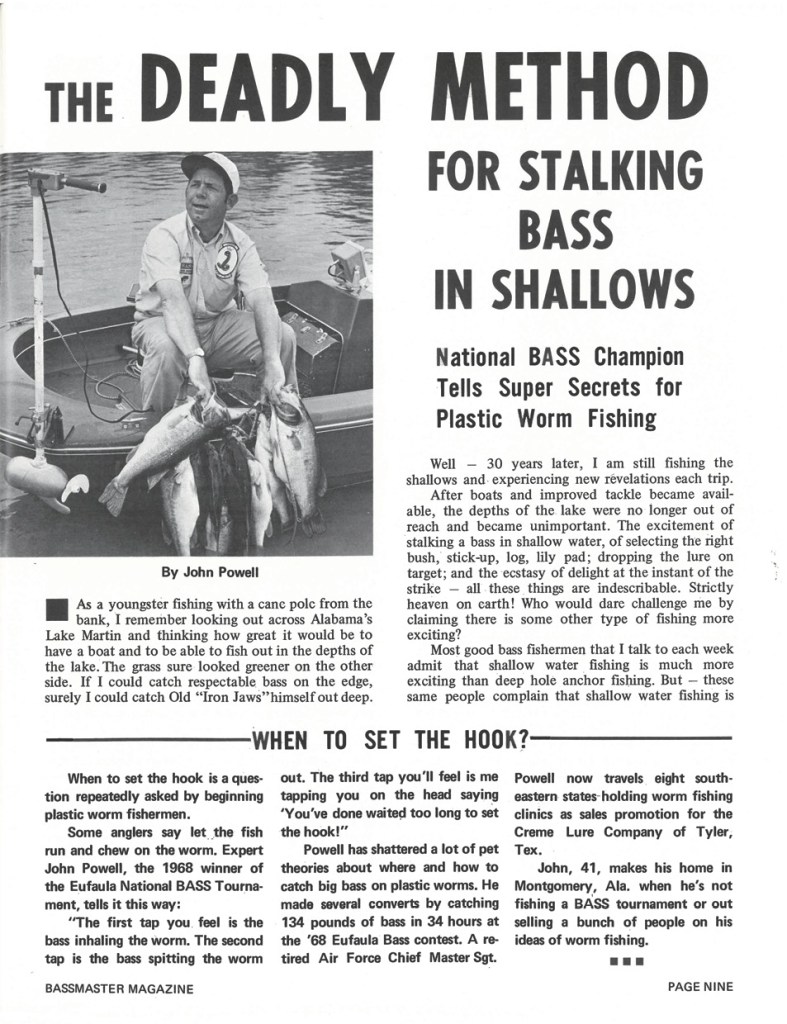
B.A.S.S. Publications heralded not only a new era of bass fishing heroes, but a new language, as well. Fishermen in different locales had a common lingo, but its use was not widespread. The terms used by tournament anglers — like “structure,” “dropoff,” “buzzin’ the top” or “pattern fishing technique” — were coined simply to convey the action. The foundation of how today’s bass anglers communicate basically was launched from the pages of Bassmaster Magazine.
The B.A.S.S. Bible chronicled the winning ways of the pros and revealed the hottest new lures and tackle favored by the top ranked pros. It was not the “Big Three” outdoor editors that had the inside track on the growth of the bass fishing industry.
Bassmaster Magazine is the voice of the Bass Fishing Tournament Trail. The pro’s proven tournament techniques and tactics revealed at weigh-ins are poured into a funnel of know-how that drips out into the pages of Bassmaster in each issue. Here’s to the future and “Bass Wishes” to Editor James Hall, who keeps our magazine rolling off the printing presses. He has fulfilled a Bible calling.
MATTHEW 4:19-20 “Follow me, and I will make you fishers of men.”
“I didn’t monkey around much with the author’s copy. Our readers glanced over the slaughtered grammar.”|
— Ray Scott

